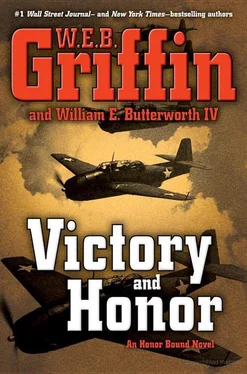“Maybe afterward,” Dorotea said, flicked her tongue in his ear, and broke their embrace.
Then something caught his eye. Three men were walking up to them.
One of the men wore a clerical collar and was fond of referring to himself as a simple priest. This was not precisely the truth, the whole truth, and nothing but the truth. Clete had once thought of the Reverend Kurt Welner, S.J.—a bespectacled, slim, fair-skinned man who’d lost most of his light brown hair and looked to be in his forties—as the éminence grise behind the throne of the Cardinal Archbishop of Argentina and the official chair of the president of the Argentine Republic, whose confessor he was.
Events over the last twenty-odd months had caused Frade to add to that the throne of the Papal Nuncio to Argentina, and to conclude that if Welner was not de jure Pope Pius XII’s man in Argentina, he held that role de facto. Well, maybe not directly, but through one or more of the most senior cardinals in Pius XII’s inner circle.
At dinner one night in Lisbon, Allen W. Dulles had told Frade that when dealing with Welner—or any other Roman Catholic clergyman of importance—the thing to keep in mind was that they understood their first priority was to preserve the Roman Catholic Church and always acted accordingly.
Welner had been el Coronel Jorge G. Frade’s best friend, as well as his confessor, and as soon as Clete had arrived in Buenos Aires Welner had appointed himself to that role for Cletus Frade. He had been very helpful in several difficult situations, and would doubtless be helpful in the future. But after his dinner with Dulles, Clete had never been able to look at Welner without remembering what Dulles had said about the highest priority of powerful, influential Roman Catholic clergymen.
The second man was General de Brigada Alejandro Bernardo Martín, a tall, fair-haired, light-skinned thirty-nine-year-old. Frade was about as surprised to see Martín in uniform as he was to see either him or Father Welner in the hangar, and wondered who had had the big mouth announcing the Connie’s arrival.
Martín was chief of the Ethical Standards Office of the Argentine Ministry of Defense’s Bureau of Internal Security, the official euphemism for the Argentine Intelligence and Counterintelligence Service, and usually wore civilian clothing.
Also in the last twenty-odd months, Frade and Martín had become close friends. Before that, they had been adversaries, which caused Clete to consider that Martín’s first priority still was the Argentine Republic—and that the priorities of the Argentine Republic were most often not the same as those of the Office of Strategic Services.
The third man was an American officer, Major Anthony J. Pelosi, whose pink and green uniform was adorned with the golden aiguillette of a military attaché, parachutist’s wings, and the ribbon of the Silver Star medal, the nation’s third-highest award for gallantry. His citation was as vague vis-à-vis exactly what he had done, and where, as was Frade’s Navy Cross citation, and for the same reasons.
“Gentlemen,” Clete said, “may I say I’m dazzled by your military sartorial splendor? Alejandro, I don’t think I’ve ever seen you in your general’s suit.”
Martín said: “Surely you’ve heard, Colonel Frade, that Argentina is now at war and we are allies?”
Frade had indeed been told that Argentina had declared war on the Axis powers on March 29, about six weeks earlier.
He said: “I do remember hearing something about that, now that you mention it. It looks like our side is winning, doesn’t it?”
“In Europe, Colonel, it seems we have won,” Martín said.
He handed Frade a copy of the Buenos Aires Herald , an English-language newspaper.
“This is today’s edition,” Martín said.
Splashed across the front page was a photograph of an immaculately turned-out German officer sitting at a desk. His marshal’s baton lay on the desk beside his upside-down uniform cap, which held one of his gloves.
The caption beneath the photograph read: German Field Marshal Wilhelm Keitel signs a surrender document at Soviet headquarters in Berlin, May 9, 1945. The Soviets insisted that a second ceremonial signing take place in Soviet-occupied Berlin.
“Interesting,” Clete said. “I heard the Krauts surrendered to General Eisenhower in Reims, France, on May seventh.”
“It says the Russians demanded that there be a second signing in Berlin,” Martín pointed out unnecessarily.
“Well, wherever it happened, it certainly calls for a celebration drink, wouldn’t you say, Alejandro?”
“I would say that what calls for a celebration,” Father Welner said, “is that you pulled it off.”
“Pulled what off?” Clete asked.
“Bringing Karl and Peter here, of course,” Welner said. “I really didn’t think you stood much of a chance.”
“Oh, ye of little faith!” Clete said. “What I’m wondering, Father, is who had the big mouth and told you—and the general—about it. I just don’t think your being here is a coincidence.”
“I did,” Dorotea said simply. “I told both of them. I thought they might be able to help.”
Clete looked at his wife. She was not only more intimately involved with his OSS activities than anyone suspected—except perhaps Martín and Welner—but she was very good at it.
If she told them not only that I had gone to Washington, but why, she had her reasons. What the hell could they be?
“How the hell could they have helped?” Frade asked, more confused than annoyed or angry.
“Perhaps she had this in mind, Cletus,” the priest said, handing him an envelope. “There was no question in Dorotea’s mind that you would succeed.”
Clete opened the envelope. It held two booklets called libretas de enrolamiento . One was in the name of Kurt Boltitz and the other in that of Peter von Wachtstein, both of whom, according to the LE, had immigrated to Argentina in 1938.
“Karl,” Frade called out, “make Hansel stop forcing himself on that poor woman, and the both of you come over here.”
When they had, Clete handed them the identity documents.
“Say ‘thank you’ to Dorotea,” Clete said. “But not to either of these two, for I’m sure neither of them would break the—at least—ten laws of the Argentine Republic somebody had to break to get these.”
Boltitz and von Wachtstein had known Martín officially when they had been respectively the naval attaché and the assistant military attaché for air of the embassy of the German Reich.
Martín offered his hand to Boltitz and said, “Karl.”
Boltitz replied, “Alejandro.”
Martín then did the same thing to von Wachtstein.
Neither said “thank you,” but profound gratitude could be seen in the eyes of the Germans.
“How good are those, Alejandro?” Frade asked.
“They will withstand all but the most diligent scrutiny,” Martín said, and then added: “We’ll get into that when we talk.”
“Okay.”
“It would be better if we talked now,” the priest said.
Clete looked between the two Argentines and his wife.
“Here?”
“Why don’t we go to the house on Libertador San Martín?” Dorotea suggested. “The men could have a shower, and then we could talk over lunch. Everyone else can go to Doña Claudia’s house and we can all get together later.”
Clete looked at his wife and thought: Why do I think this has been the plan all along?
Beth Howell was visibly—and vocally—distressed at being separated from Boltitz. But aside from her exception, Dorotea’s plan went unchallenged.
The men, plus Dorotea, went to what Cletus thought of as “Uncle Willy’s house by the racetrack”—it was across Avenida Libertador General San Martín from the Hipódromo de Palermo—in a four-car convoy. Martín’s official Mercedes led the way, followed by Tony Pelosi’s U.S. Embassy 1941 Chevrolet, then by Father Welner’s 1940 Packard 280 convertible—a gift from el Coronel Jorge G. Frade—and finally by the enormous Horch touring car that had been el Coronel Frade’s joy in life and in which he had been assassinated.
Читать дальше












